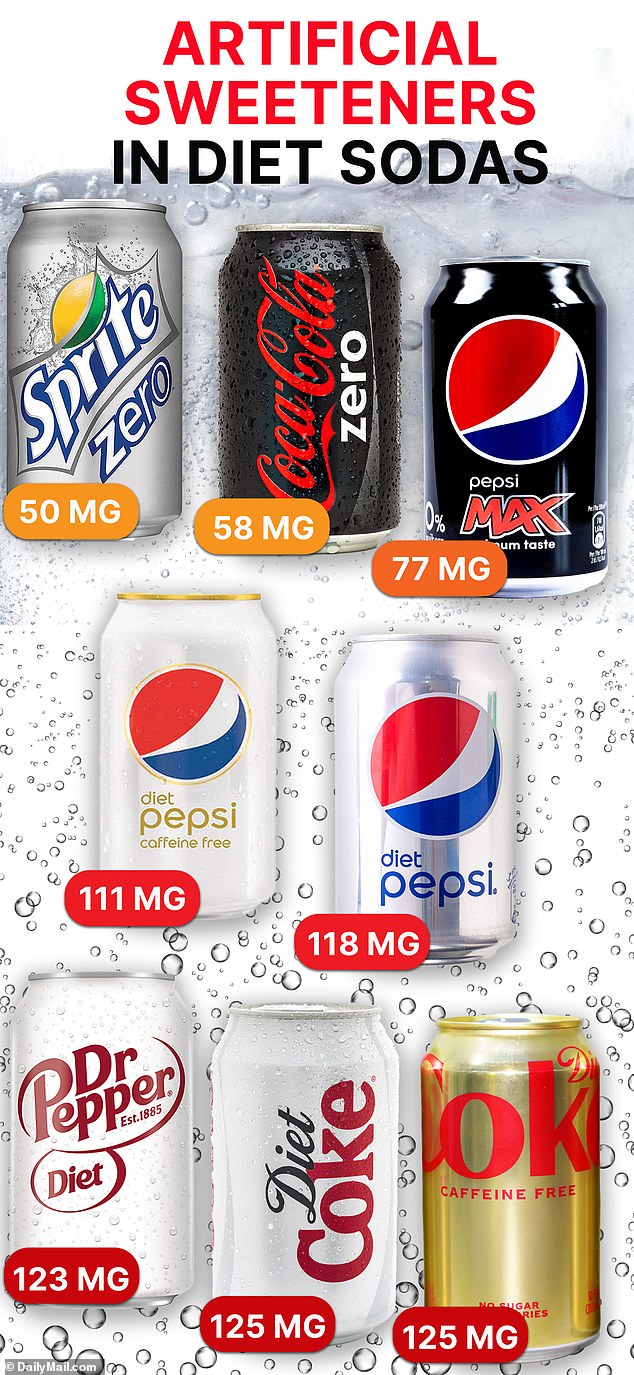Diet soda shockingly linked to devastating disease that kills 100,000 Americans each year
- READ MORE: Thousands of cans of Dr Pepper recalled over major health risk
Diet soda might no longer be a healthier option, after all.
A new study found people who regularly drink them have more than double the risk of developing type 2 diabetes compared to the general public.
High-sugar drinks like soda and fruit juices have long been linked to diabetes, but now researchers are warning artificial sweeteners may also cause problems.
The scientists found that high intake of saccharin - a common zero-calorie artificial sweetener found in diet drinks - could be the main risk factor for the chronic illness, which is suffered by 37 million Americans.
The FDA approved the use of saccharin as a zero-calorie alternative to sugar in various foods and beverages in 1977.
But saccharin is at least 300 times sweeter than regular sugar and researchers now believe excess consumption may interfere with the body's natural process of utilizing glucose - a sugar the body uses for energy.
Based on their findings, study author Lyn Steffen recommended 'limiting the use of any sweetener' and suggested choosing 'unsweetened water, coffee, tea, milk or a small amount of 100 percent fruit juice' for beverages.

The researchers examined the diets of 4,654 adults between 1985 to 2015.
The participants' average intake of artificial sweeteners, diet beverages, aspartame (a low-calorie artificial sweetener) and sucralose (a synthetic artificial sweetener) were measured in the first year, seventh year and Year 20.
The study did not include people who regularly or occasionally drink full sugar sodas.
Based on their results, the participants were divided into groups to determine their probability of developing type 2 diabetes .
During this 30-year period, 691 participants developed diabetes.
Results showed that the participants who consumed the most diet sodas in the 30 year period had a 129 percent greater chance of developing diabetes than those who barely drank any diet beverages.
Additionally, the researchers also found that those who drank sodas loaded with saccharin such as fountain Diet Coca Cola, Diet Dr Pepper and Tab had a 110 percent increased risk of diabetes.
No link was found between diabetes and aspartame or sucralose.
The observational study did not determine the reason why artificial sweeteners may lead to Type 2 diabetes.
However, the researchers believe that consuming excessive diet sodas with artificial sweeteners that are overall much sweeter than real sugar may interfere with the body's metabolism process and lead to excess sugar in the bloodstream.

According to the American Heart Association, men should consume no more than 36 grams or 150 calories of sugar per day while women should consume no more than 25 grams or 100 calories of sugar per day.
However, an 8oz can of Sprite Zero contains 50 mg artificial sweeteners, Coke Zero contains 58 mg and Pepsi Max has 77 mg.
Along with this, Diet Pepsi and Caffeine-Free Diet Pepsi both contain 111 mg and 118 mg, respectively while Diet Dr Pepper has a shocking 123 mg of artificial sweeteners.
Both Diet Coke and Caffeine-Free Coke have 125 mg of artificial sweeteners too.
Excess sugar consumption can pave the way for weight gain, high blood pressure, heart disease and insulin resistance, which can cause Type 2 diabetes.
Type 2 diabetes is the most common form of the condition and over 37 million American adults suffer from this form of the chronic illness.
The CDC reports that over 100,000 Americans die of diabetes every year.
It is caused by either the pancreas not producing enough insulin - a hormone that regulates blood sugar levels - or the body's cells not responding properly to insulin.
When you eat sugar, your body breaks it down into glucose, which the enters your bloodstream for energy absorption.
To regulate blood sugar levels, the pancreas releases insulin, which helps glucose enter your cells for energy.
But consuming excessive amounts of sugar can make the body resistant to insulin, meaning it can't effectively use the insulin to lower blood sugar.
This leads to high blood sugar levels and a buildup of glucose in the bloodstream, which can damage the eyes, kidneys, nerves and heart.
While the chronic illness cannot be permanently treated, patients are advised to regulate their blood sugar levels through medication, healthy eating, physical activity and stress management.
Read more
Posting Komentar untuk "Diet soda shockingly linked to devastating disease that kills 100,000 Americans each year"
Posting Komentar